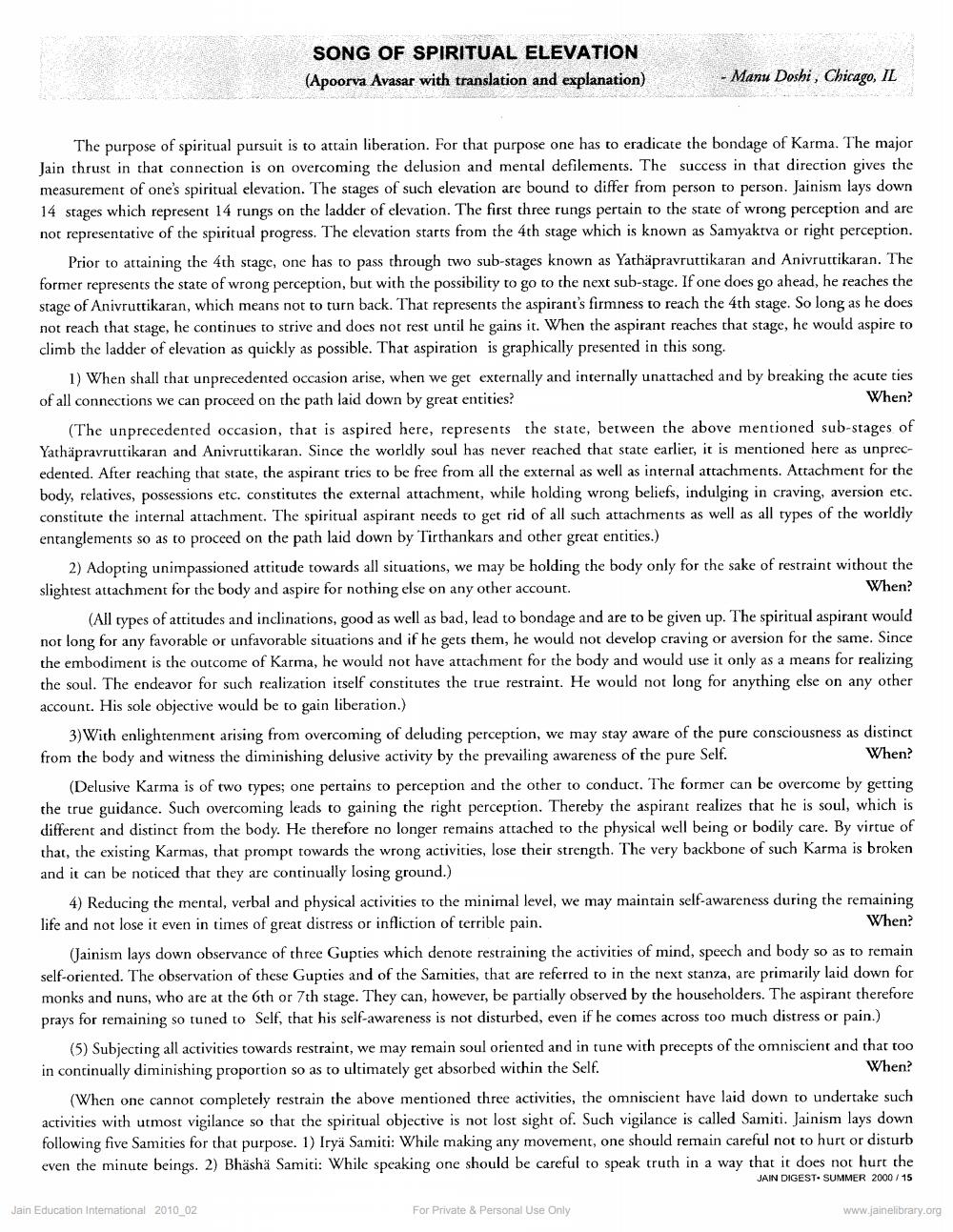________________
SONG OF SPIRITUAL ELEVATION (Apoorva Avasar with translation and explanation)
The purpose of spiritual pursuit is to attain liberation. For that purpose one has to eradicate the bondage of Karma. The major Jain thrust in that connection is on overcoming the delusion and mental defilements. The success in that direction gives the measurement of one's spiritual elevation. The stages of such elevation are bound to differ from person to person. Jainism lays down 14 stages which represent 14 rungs on the ladder of elevation. The first three rungs pertain to the state of wrong perception and are not representative of the spiritual progress. The elevation starts from the 4th stage which is known as Samyaktva or right perception.
Manu Doshi, Chicago, IL
Prior to attaining the 4th stage, one has to pass through two sub-stages known as Yathäpravruttikaran and Anivruttikaran. The former represents the state of wrong perception, but with the possibility to go to the next sub-stage. If one does go ahead, he reaches the stage of Anivruttikaran, which means not to turn back. That represents the aspirant's firmness to reach the 4th stage. So long as he does not reach that stage, he continues to strive and does not rest until he gains it. When the aspirant reaches that stage, he would aspire to climb the ladder of elevation as quickly as possible. That aspiration is graphically presented in this song.
1) When shall that unprecedented occasion arise, when we get externally and internally unattached and by breaking the acute ties of all connections we can proceed on the path laid down by great entities? When?
(The unprecedented occasion, that is aspired here, represents the state, between the above mentioned sub-stages of Yathäpravruttikaran and Anivruttikaran. Since the worldly soul has never reached that state earlier, it is mentioned here as unprecedented. After reaching that state, the aspirant tries to be free from all the external as well as internal attachments. Attachment for the body, relatives, possessions etc. constitutes the external attachment, while holding wrong beliefs, indulging in craving, aversion etc. constitute the internal attachment. The spiritual aspirant needs to get rid of all such attachments as well as all types of the worldly entanglements so as to proceed on the path laid down by Tirthankars and other great entities.)
2) Adopting unimpassioned attitude towards all situations, we may be holding the body only for the sake of restraint without the slightest attachment for the body and aspire for nothing else on any other account.
When?
(All types of attitudes and inclinations, good as well as bad, lead to bondage and are to be given up. The spiritual aspirant would not long for any favorable or unfavorable situations and if he gets them, he would not develop craving or aversion for the same. Since the embodiment is the outcome of Karma, he would not have attachment for the body and would use it only as a means for realizing the soul. The endeavor for such realization itself constitutes the true restraint. He would not long for anything else on any other account. His sole objective would be to gain liberation.)
3) With enlightenment arising from overcoming of deluding perception, we may stay aware of the pure consciousness as distinct When? from the body and witness the diminishing delusive activity by the prevailing awareness of the pure Self.
(Delusive Karma is of two types; one pertains to perception and the other to conduct. The former can be overcome by getting the true guidance. Such overcoming leads to gaining the right perception. Thereby the aspirant realizes that he is soul, which is different and distinct from the body. He therefore no longer remains attached to the physical well being or bodily care. By virtue of that, the existing Karmas, that prompt towards the wrong activities, lose their strength. The very backbone of such Karma is broken and it can be noticed that they are continually losing ground.)
4) Reducing the mental, verbal and physical activities to the minimal level, we may maintain self-awareness during the remaining life and not lose it even in times of great distress or infliction of terrible pain. When?
(Jainism lays down observance of three Gupties which denote restraining the activities of mind, speech and body so as to remain self-oriented. The observation of these Gupties and of the Samities, that are referred to in the next stanza, are primarily laid down for monks and nuns, who are at the 6th or 7th stage. They can, however, be partially observed by the householders. The aspirant therefore prays for remaining so tuned to Self, that his self-awareness is not disturbed, even if he comes across too much distress or pain.)
(5) Subjecting all activities towards restraint, we may remain soul oriented and in tune with precepts of the omniscient and that too in continually diminishing proportion so as to ultimately get absorbed within the Self. When?
Jain Education International 2010_02
(When one cannot completely restrain the above mentioned three activities, the omniscient have laid down to undertake such activities with utmost vigilance so that the spiritual objective is not lost sight of. Such vigilance is called Samiti. Jainism lays down following five Samities for that purpose. 1) Iryä Samiti: While making any movement, one should remain careful not to hurt or disturb even the minute beings. 2) Bhäshä Samiti: While speaking one should be careful to speak truth in a way that it does not hurt the
JAIN DIGEST. SUMMER 2000/15
For Private & Personal Use Only
www.jainelibrary.org




